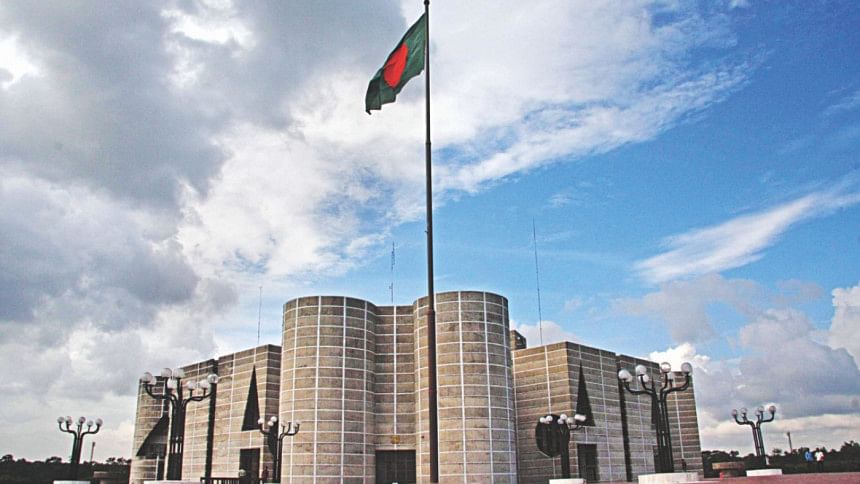Credible Elections and 'Caretaker' Government

On July 26, BNP Chairperson Khaleda Zia said 'a caretaker government is not a must for holding national election, but it has to be held under a neutral government, no matter what its name is'. In response to this, AL Secretary General Syed Ashraful Islam reiterated AL's position saying that 'the next polls will be held as per Constitution'. Such positions by AL and BNP are not new. Before the 10th parliamentary elections, on July 5, 2013, the Prime Minister, during her visit in UK, said that the next (10th) general elections of Bangladesh would be held in a manner followed by the United Kingdom and other democratic nations across the world. After the election, Sheikh Hasina, again in a press conference held on July 26, 2014, 'categorically said the next (11th) parliamentary polls would be held in light of the democratic process and as per constitutional provisions' (The Daily Star, July 27, 2014).
The issue of election-time government has become the major confrontational issue in Bangladeshi politics. Hence, this article tries to describe how elections are conducted in established democracies. What types of governments are there in those countries during elections? Is there a caretaker government? I have tried to analyse election-time governments in a few countries both from established and developing democracies including the UK. Legal and administrative provisions along with recent practice and evidence of those countries have also been discussed.
According to Carl J. Fredrick, "Mr. Churchill, the ex-prime minister of UK, had formed the non-party caretaker government, for the first time, in the world and conducted a general election in 1945 in Britain to manage an unprecedented emergency, which occurred as a result of the collapse of France and danger of immanent invasion." The 'caretaker' government still existed in the UK. As per Fixed Term Parliament Act 2011, the parliament automatically dissolves at 00.01 on 30 March, 25 working days before any general election. This pre-election period is known as 'purdah' which is in use across central and local governments to describe the period of time immediately before elections or referendums. Earlier, this period was not clear; hence, the House of Commons Justice Committee published a report on the constitutional process following a general election on March 16, 2010. The committee recommended the use of the term 'caretaker' in formal guidance over 'purdah' as it found that 'purdah' traditionally refers to restrictions on government announcements, as opposed to more general restrictions as per caretaker conventions in other jurisdictions. During this period, the incumbent government's decision-making capacity is significantly curtailed by what is known as the 'caretaker convention'. The convention is an unwritten rule of political behaviour which holds that in such circumstances a government should restrict decision-making to routine, non-controversial matters.
In Australia, during elections, the outgoing government becomes a 'caretaker' one. In Australian political and constitutional terminology, a caretaker government is a government during a period that starts when the parliament is dissolved. During the 1975 Australian constitutional crisis, the Governor-General, Sir John Kerr, appointed a new government headed by Malcolm Fraser, subject to Fraser's agreement that he would immediately advise a general election, and his government would operate on a caretaker basis in the meantime. Under the current provisions, Australia has the practice of 'caretaker' government during elections. The country has official guidelines entitled "Guidance on Caretaker Conventions" which is administered by the Department of the Prime Minister and Cabinet. Section 1.1 of this guide states that, "during the period preceding an election for the House of Representatives, the government assumes a 'caretaker role". Section 1.2 defines that "the caretaker period begins at the time the House of Representatives is dissolved and continues until the election result is clear or, if there is a change of government, until the new government is appointed."
Similar to the UK and Australia, there is the practice of 'caretaker' government in New Zealand. Its Cabinet Manual suggests that governments choose to restrict their actions to some extent in the period approximately three months before an election is due or from the date an election is announced, if this is within three months of the election date. Examples of forms of restraint given are the deferral of significant appointments and limitations on government advertising. When Parliament is dissolved prior to an election a Government (even one with a majority in the House) is no longer meeting Parliament and accounting to it for the exercise of executive power. There would therefore appear to be a strong case for saying that a caretaker convention ought to apply from that point on to constrain the making of important decisions by the Government until the outcome of the election is clear.
In the Netherlands, there is a provision of 'demissionary cabinet' during elections which is a type of 'caretaker' government. As per constitutional convention the incumbent government continues as demissionary cabinet after the conventional cabinet is ended. The demissionary cabinet has fewer powers than a conventional cabinet. The main purpose of a demissionary cabinet is to organise elections and take care of ongoing business until the new cabinet comes to power. Besides organising elections, it can only take care of urgent and pressing matters and not initiate controversial legislation.
In India, the government at the time of dissolution of Lok Sabha usually continues until the election process is completed and the new government is ready to take over. Article 75 of the Constitution of India permits the Ministers, including the Prime Minister, to continue for six months without being the member of either house. The President can, therefore, without any breach of law or convention, constitute a Council of Ministers from other than legislators for a short period only for conducting the General Elections. Although the Indian Constitution does not have any mention about 'caretaker' government, there are huge numbers of judgments on this. On August 23, 1974, the Indian Supreme Court stated that "apart from the technical difficulty of carrying out the many details of a general election in such a situation the President might have to dismiss the Ministry and install a caretaker government to co-operate with him in ordering a general election". In 1997, Allahabad High Court, in a different verdict, directed "Shri Charan Singh and his ministers to continue office as a caretaker government" before the 7th Lok Sabha election.
Thus, in the Westminster system, the incumbent government always becomes a 'caretaker' one between the normal dissolution of parliament for the purpose of holding an election and the formation of a new government after the election results are known.
Now, what are the elections like in these countries? Are there any questions of credibility of elections in the UK, Australia, the Netherlands and New Zealand? Research and evidence shows that elections in these countries are conducted in line with 'international standards' and are 'free of bribery, intimidation and other abuses'. The 2014 elections in New Zealand were one of the best elections as per Perceptions of Electoral Index (PEI) with a score of 80.4 out of 100; while the Netherlands, Australia and India scored 82.6, 75.9 and 67.0 respectively.
On the other hand, the countries which do not have the provision of 'caretaker' government, during elections, failed to meet the international standards of elections as per PEI. Equatorial Guinea (Score 38.4), Djibouti (40.1), Afghanistan (46.0), Mozambique (47.8), Bangladesh (49.5) are a few of those countries.
One of the most important ways in which elections can be regarded as legitimate is through the development of credible election administration institutions and 'caretaker' government is the most critical. Such a government may be (i) incumbent partisan (UK, New Zealand, Australia) or (ii) non-partisan (Bangladesh in 1996, 2001, 2008).
The writer is Director, Election Working Group.
E-mail: [email protected]

 For all latest news, follow The Daily Star's Google News channel.
For all latest news, follow The Daily Star's Google News channel. 



Comments